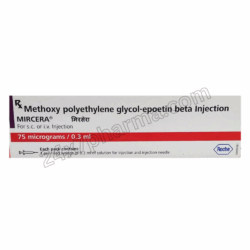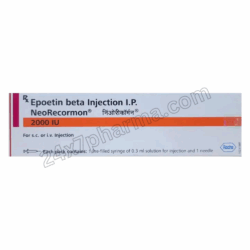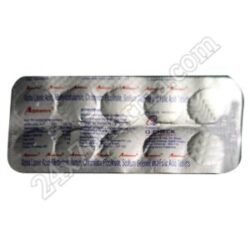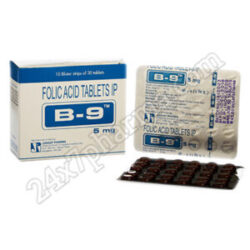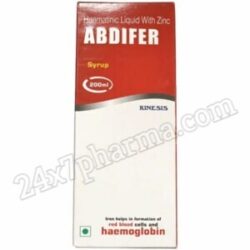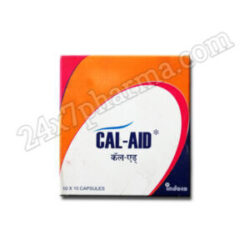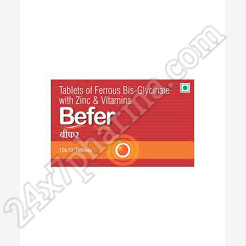Mircera 100 mcg Injection, containing methoxy polyethylene glycol-epoetin beta, is an innovative treatment designed to combat anemia in patients with chronic kidney disease (CKD). This long-acting erythropoiesis-stimulating agent (ESA) works to regulate red blood cell production, helping to restore energy and vitality in individuals suffering from anemia. Mircera has revolutionized anemia management with its extended dosing intervals and proven efficacy.
What Is Mircera 100 mcg Used For?
Mircera 100 mcg is primarily used to treat anemia associated with chronic kidney disease (CKD) in both dialysis and non-dialysis patients. By increasing red blood cell levels, it alleviates symptoms such as fatigue, weakness, and shortness of breath. Mircera 100 mcg injection is an essential solution for patients seeking to improve their quality of life while managing the complications of CKD-induced anemia.
How Does Mircera 100 Work?
Mircera 100 mcg (methoxy injection) works by mimicking the action of erythropoietin, a natural hormone produced by the kidneys. The active ingredient, methoxy polyethylene glycol-epoetin beta, binds to erythropoietin receptors in the bone marrow, stimulating red blood cell production. Its unique formulation allows for extended dosing intervals, reducing the need for frequent injections while maintaining stable hemoglobin levels.
Benefits of Mircera 100 mcg
- Prolonged Action: Mircera 100 mg offers long-lasting effects, enabling dosing every two to four weeks.
- Improved Hemoglobin Stability: It helps maintain consistent hemoglobin levels, reducing anemia symptoms.
- Convenience: Extended dosing intervals make it easier for patients to adhere to their treatment plans.
- Enhanced Quality of Life: By addressing anemia, Mircera restores energy and reduces fatigue.
- Proven Efficacy: Clinical studies demonstrate the effectiveness of methoxy polyethylene glycol-epoetin beta in anemia management.
How to Use Mircera 100?
Mircera 100 mcg should be administered under the guidance of a healthcare professional. It can be injected subcutaneously (under the skin) or intravenously (into a vein), depending on the doctor’s recommendation. Dosage and frequency depend on the patient’s hemoglobin levels, weight, and treatment goals. Always follow the prescribed schedule and consult your doctor for any adjustments to avoid complications.
Side Effects of Mircera 100 mcg (Methoxy Injection)
While Mircera 100 mg is generally well-tolerated, some patients may experience side effects, including:
Injection site reactions such as redness or swelling
- High blood pressure (hypertension)
- Headaches
- Diarrhea or nausea
- Edema (swelling in the legs or arms)
Rare but serious side effects include blood clots or severe allergic reactions. Seek immediate medical attention if you notice unusual symptoms or severe discomfort after using Mircera 100.
Is Mircera 100 Safe for You?
Mircera 100 is safe when used as prescribed. However, patients with uncontrolled hypertension or hypersensitivity to methoxy polyethylene glycol-epoetin beta should not use this medication. Pregnant or breastfeeding women must consult their doctor before starting treatment. Regular monitoring of hemoglobin levels is crucial to ensure the medication’s safety and effectiveness.
Where to Buy Mircera 100 mcg Injection?
You can purchase Mircera 100 mcg from licensed pharmacies or trusted online platforms. Ensure you buy from reputable sources to receive genuine products. Comparing Mircera 100 mcg injection prices online can help you find affordable options without compromising quality. Always prioritize authenticity to avoid counterfeit medications.
Mircera Dosage Variants
Mircera is available in various dosage strengths to cater to individual patient needs. Apart from Mircera 100 mcg, other variants include
Your doctor will determine the most suitable dosage based on your condition and treatment response. Adhering to the prescribed dosage is critical for optimal results.
Why Choose Mircera 100 mcg?
- Convenience: Extended dosing intervals reduce the frequency of injections.
- Efficacy: Methoxy polyethylene glycol-epoetin beta effectively manages anemia.
- Patient-Centric Design: Flexible dosing options cater to individual needs.
- Proven Safety: Clinical trials validate its safety profile for CKD patients.
- Trusted Solution: Mircera 100 injection price reflects its value in enhancing patients’ quality of life.
FAQs About Mircera 100
Q1. Is Mircera 100 suitable for dialysis patients?
Ans: Yes, Mircera 100 mcg is effective for both dialysis and non-dialysis CKD patients.
Q2. How often do I need Mircera injections?
Ans: The dosing frequency varies but is typically once every two to four weeks.
Q3. Can I self-administer Mircera 100?
Ans: Only under proper training and guidance from your healthcare provider.
Q4. Are there dietary restrictions while using Mircera?
Ans: Maintaining a balanced diet with adequate iron and vitamin B12 can enhance treatment effectiveness.
Additional Tips for Managing Anemia
- Include iron-rich foods like spinach, lean meats, and beans in your diet.
- Stay hydrated and exercise moderately to boost overall health.
- Regularly monitor hemoglobin levels and follow your doctor’s recommendations.
- Avoid skipping doses to maintain stable hemoglobin levels.
Mircera 100 (methoxy injection) provides a reliable and effective solution for anemia management in CKD patients. Consult your healthcare provider to determine if it’s the right choice for you, and experience the transformative benefits of this advanced treatment.


